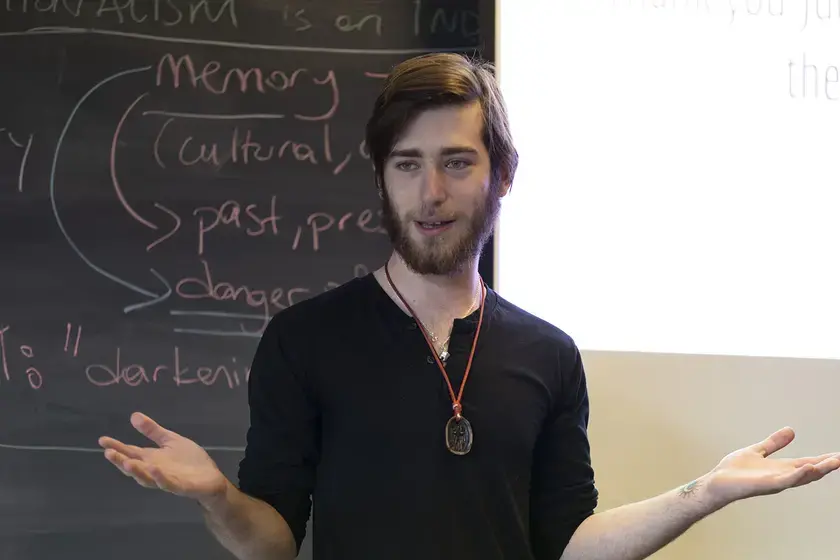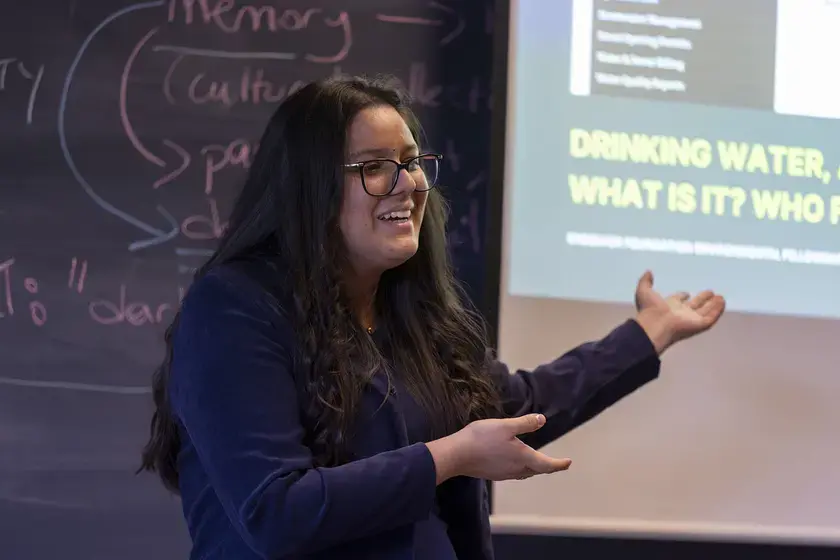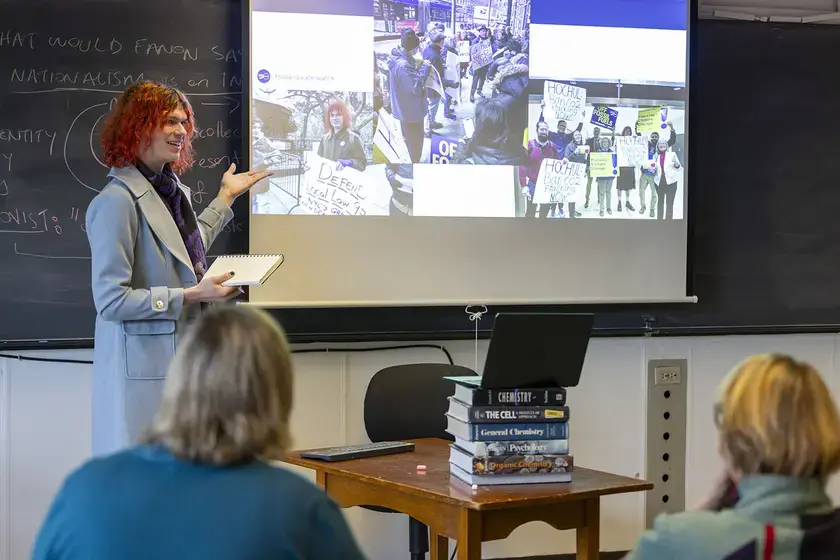Learning to Take Public Action: Endeavor Environmental Action Fellowships 2024
The American writer and political activist Alice Walker said “Activism is my rent for living on the planet.” This could have been the theme for this year’s Endeavor Environmental Action Fellowship.



Phone banking. Petitions. Research. Social media. These are the types of words that appeared most frequently in presentations by the 2024 Endeavor Environmental Action Fellows on a cloudy early spring day in Dickinson 148.
The fellowship is supported by the Endeavor Foundation. In-person and virtual audience members included Ashley Kidd, Vice President and Director of Programs at the Endeavor Foundation; Bennington College President Laura Walker; Associate Dean of Career Development & Field Work Term John Link; Vice President for Diversity, Equity, and Inclusion Alfredo Medina, Jr., and others.
Fourteen students—under the direction of Judith Enck, faculty member at the Center for the Advancement of Public Action and President of Beyond Plastics—presented the work they did with environmental organizations locally, nationally, and worldwide over Field Work Term. Themes among some students’ experiences related to inspiring youth, improving access to crucial environmental information, and learning how to move the levers of power.
“I am so proud of what these students were able to accomplish during their Field Work Terms,” said Enck. “They served their host organizations well and made significant contributions toward their projects, and they learned how to be effective advocates working for a better world. Whatever their future holds, they have new skills and confidence that will allow them to tackle any issue they want to jump in on.”
Inspiring Youth
Alex Libby ’27, who studies Environmental Studies and Music, worked for Cafeteria Culture in New York City. He taught kids about waste and supported the expansion of school-wide plastic-free lunch days. He realized throughout his Field Work Term, “my purpose there was not to make the change; it was to help the kids to learn to make the change.” Students who had been disengaged at the start began to take an interest in doing what they could. They sorted trash to determine how it could be reduced.
Libby also focused on making sure that the students knew that having a polluting power plant in their neighborhood was not normal and that they were living in the middle of an environmental justice area of New York City. This information energized them to take greater action and make change. Now, he said, “those kids are fighting like their future is on the line, because it is.”
Across the world in Bangladesh, Mehedi Sizar ’26 joined the team of BD Clean, an organization that uses more than 40,000 volunteers to clean up plastic pollution. “It was super fun working with the kids,” Sizar said. “The kids are more interested in cleaning.” Through the use of before-and-after videos, which show the difference between a plastic-polluted area and a clean one, the organization resets expectations regarding waste and inspires people to change their habits. “My plan is to go back to Bangladesh and continue the advocacy and work with local administrations.”
Crunching Data
Alejandra Vouga Aguilera ’26 and Louis Albanese ’26 worked for the Hudson River Riverkeeper. They used studies in data science to create standardized representations of water quality reports. By having all of the data presented uniformly across communities, they could present it in ways that show the need for legislative action. For instance, the use of road salt has pushed sodium levels in the drinking water in the Hudson River watershed to unhealthy levels, especially for people with heart disease. The students’ data informed their lobbying, written testimony, and presentations aimed at new legislation to address the issue.
Tisa Shrestha ’26 is an architecture student who worked with LI-BIRD, a Nepal-based non-governmental organization on their disaster anticipatory action plan project.
“I learned something new and out of my comfort zone every day,” she said. “Not being able to draw or design felt unfamiliar, but I soon realized that I was still engaging in design and planning, albeit through research, advocacy, and writing, which I did find rewarding.”
As a research intern, she contributed to the project's detailed implementation plan and environmental and social safeguarding policy. The project aimed to develop an effective anticipatory landslide/flood risk management plan by establishing early warning systems, providing agricultural advisory services, and implementing an information dissemination plan for the Goche watershed in Gurbhakot Municipality, Surkhet, in western Nepal. “I learned that my strengths are adaptability, consistency, and rapid learning,” she said.
Pulling the Levers of Power
August Schnell ’26 worked with the Vermont Public Interest Research Group (VPIRG) to advance a modernized bottle bill and the creation of a climate superfund program. The organization’s motto was simple: “If you make a mess,” they said to big oil companies, “you clean it up.” Through phone banking and petitions, Schnell said, “I grew my advocacy skills a lot, and I was able to see how the legislative process works.” One of their best moments was when Senator Dick Sears, who has been slow to support environmental legislation in the past, spoke at a VPIRG press conference aimed at making big oil companies pay for destruction caused by climate-related flooding in the state.
June Meuser '26 worked for Food and Water Watch. Their job was to get volunteers and legislators out to the group’s events. They made countless phone calls and helped their organization reach a turnout of 350 people at an event to support the New York Heat Act and to garner publicity and media coverage at several events. In front of New York City Hall, they and others intercepted more than half of city lawmakers to advocate for a new clean building code. “It felt pretty fulfilling," they said. "We followed officials where they were. We would not let ourselves be put in the shadows.” On Climate Change Super Fund Act Day, Meuser played a major role in convincing a long-time holdout on environmental legislation to co-sponsor a bill that would collect billions of dollars from the biggest polluters to repair infrastructure damaged by climate change. “That was probably my biggest victory,” they said.
Adrian Vidal ’24, who worked for New York Communities for Change, learned how gratifying it is to reach everyday people with the information they need to act. He and his colleagues went door to door, tabled in front of grocery stores, and protested in public spaces. In one case, he and his colleagues unfurled a protest banner in the lobby of an organization with hypocritical ties to a big oil company. “We wanted to draw attention to organizations whose profit is directly tied or correlated with a problematic institution,” he said. In another, he and his colleagues followed an influential lawmaker to a speaking engagement and held signs quietly to ensure the audience knew that he was falling short on a promise to divest from a major polluter. “Public disruption is the only way to hold elected officials accountable to their constituents,” he said.
At the close of the presentations, Ashley Kidd, of the Endeavor Foundation, addressed students via Zoom. “I just wanted to say how much I learned and how provocative, informative, and powerful your presentations were. Depth and differences in your work, the sheer variety in activities…It’s so exciting for me working with a Foundation that supports both environmental causes and education to see how they come together.”
President Walker shared her gratitude to the students and their work and to Judith Enck for her leadership. “I can see in this room the people who will create the change we need over the next one, five, or ten years, and I am so moved.” She continued, “The relationships you have made with colleagues and with each other will shape your lives.”
Read more about Genevieve Hammatt ’26 and Paulo Araujo '26, who completed the Endeavor Fellowship in 2024.